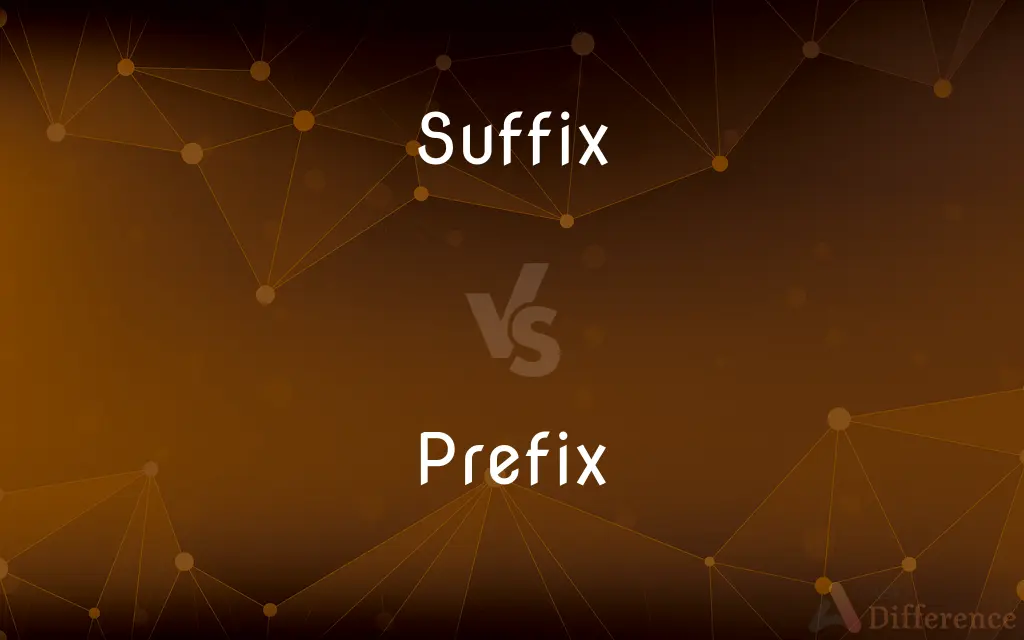Suffix vs. Prefix — What's the Difference?
Edited by Tayyaba Rehman — By Urooj Arif — Updated on April 17, 2024
A suffix is added at the end to change the word's form or function. Whereas a prefix is a set of letters added at the beginning of a word to modify its meaning.

Difference Between Suffix and Prefix
Table of Contents
ADVERTISEMENT
Key Differences
A suffix is attached to the end of a word to alter its tense, case, gender, or other grammatical aspects. Conversely, a prefix is a linguistic element used before the root of a word to adjust its meaning or create a new word.
Prefixes can negate the original meaning of a word (as with "un-" in "unhappy") or specify a relation (as with "pre-" in "prepaid"). On the other hand, suffixes often determine the part of speech (as with "-ness" turning "happy" into the noun "happiness").
Prefixes do not change the part of speech of the root word; for example, "re-" in "redo" still leaves the word as a verb. Whereas suffixes can change the grammatical category, as in turning the adjective "quick" into the adverb "quickly" using "-ly".
Suffixes also come from Latin or Greek, but often change form to match the spelling or phonetics of the root word. In English, prefixes are derived from Latin or Greek and are used without modification.
While prefixes generally maintain a consistent form regardless of the root word, suffixes may have variants depending on the final letters of the root word for phonetic coherence, such as "-able" in "agreeable" versus "-ible" in "permissible".
ADVERTISEMENT
Comparison Chart
Position
End of the word
Beginning of the word
Function
Changes word form or function
Modifies meaning
Part of Speech
Often changes
Does not change
Examples
Happiness, quickly, childish
Unhappy, redo, prewar
Origin
Mostly from Latin or Greek
Mostly from Latin or Greek
Compare with Definitions
Suffix
Can indicate tense, case, or gender in some languages.
-ed in talked shows past tense.
Prefix
A group of letters placed before the root of a word.
The prefix anti- in antifreeze suggests opposition.
Suffix
Adapts to the spelling of the root word.
-ness in darkness and -ity in activity form nouns.
Prefix
Does not change the word's part of speech.
Adding re- to build still keeps it a verb: rebuild.
Suffix
A letter or group of letters added to the end of a word.
Adding -ful to hope forms the adjective hopeful.
Prefix
Often consistent in form.
Dis- appears in disagree, disapprove, and disconnect.
Suffix
Changes the function or grammatical category of a word.
-tion turns the verb operate into the noun operation.
Prefix
Used to create new words or alter the meaning of existing words.
Mis- in misuse implies incorrect use.
Suffix
Variants depend on phonetics.
-ize in realize versus -ise in realise (British spelling).
Prefix
Can denote time, place, or manner.
The prefix sub- in submarine means below or under.
Suffix
In linguistics, a suffix is an affix which is placed after the stem of a word. Common examples are case endings, which indicate the grammatical case of nouns, adjectives, and verb endings, which form the conjugation of verbs.
Prefix
A prefix is an affix which is placed before the stem of a word. Adding it to the beginning of one word changes it into another word.
Suffix
An affix added to the end of a word or stem, serving to form a new word or functioning as an inflectional ending, such as -ness in gentleness, -ing in walking, or -s in sits.
Prefix
To put or attach before or in front of.
Suffix
To add as a suffix.
Prefix
(prē-fĭks) To settle or arrange in advance.
Suffix
A morpheme added at the end of a word to modify the word's meaning.
The suffix "-able" changes "sing" into "singable".
Prefix
To add as a prefix.
Suffix
(mathematics) A subscript.
Prefix
To add a prefix to.
Suffix
(computing) A final segment of a string of characters.
The string "abra" is both a prefix and a suffix of the string "abracadabra".
Prefix
(Grammar) An affix, such as dis- in disbelieve, attached to the front of a word to produce a derivative word or an inflected form.
Suffix
(transitive) To append (something) to the end of something else.
Prefix
A letter, word, abbreviation, or number placed before a name, address, or other identifying label to indicate class or category
You have to indicate on the form whether you prefer the prefix Mr., Ms., or Dr.
Suffix
A letter, letters, syllable, or syllables added or appended to the end of a word or a root to modify the meaning; a postfix.
Prefix
Something placed before another
Suffix
To add or annex to the end, as a letter or syllable to a word; to append.
Prefix
A morpheme added to the beginning of a word to modify its meaning, for example as, pre- in prefix, con- in conjure, re- in reheat, etc.
Suffix
An affix that is added at the end of the word
Prefix
(telecommunications) A set of digits placed before a telephone number, to indicate where the number is based, what type of phone number it is (landline, mobile, toll-free, premium rate etc.)
In the UK, a number with an 0800 prefix is a toll-free number.
Add the prefix +34 to dial a Spanish number from abroad
Suffix
Attach a suffix to;
Suffix words
Prefix
A title added to a person's name, such as Mr. or Dr.
Prefix
(computing) An initial segment of a string of characters.
The string "abra" is both a prefix and a suffix of the string "abracadabra".
Prefix
(transitive) To determine beforehand; to set in advance.
Prefix
(transitive) To put or fix before, or at the beginning of something; to place at the start.
Prefix
To put or fix before, or at the beginning of, another thing; as, to prefix a syllable to a word, or a condition to an agreement.
Prefix
To set or appoint beforehand; to settle or establish antecedently.
And now he hath to her prefixt a day.
Prefix
That which is prefixed; esp., one or more letters or syllables combined or united with the beginning of a word to modify its signification; as, pre- in prefix, con- in conjure.
Prefix
An affix that added in front of the word
Prefix
Attach a prefix to;
Prefixed words
Common Curiosities
What is the difference between a prefix and a suffix?
A prefix modifies the meaning at the beginning of a word, while a suffix changes the word’s form or function at the end.
Do prefixes always change the meaning of a word?
Generally, yes, prefixes modify meanings to convey negation, intensity, or relation.
Are suffixes responsible for changing the part of speech?
Often, suffixes change the part of speech, turning verbs into nouns, adjectives into adverbs, etc.
What are some common prefixes and their meanings?
"Pre-" means before, "anti-" means against, "sub-" means under.
Can a word have both a prefix and a suffix?
Yes, a word can have both, such as "unhappiness" (with "un-" as a prefix and "-ness" as a suffix).
How do suffixes affect verb tenses?
Suffixes like "-ed" or "-ing" in English change verbs to past tense or present participle, respectively.
What role do prefixes and suffixes play in language?
They are crucial for morphological variation, helping to expand vocabulary and express different grammatical elements.
Can the addition of a suffix change a word’s spelling?
Yes, adding a suffix can sometimes change the base word’s spelling, such as "magic" to "magical" where the 'c' changes to 'ck'.
Are there rules for using prefixes and suffixes?
There are general guidelines, such as matching suffix forms to the root word's ending for phonetic harmony.
How can learning prefixes and suffixes improve language skills?
Understanding them helps in deducing the meanings of new words and in correct word formation.
Share Your Discovery

Previous Comparison
Pentecostal vs. Apostolic
Next Comparison
Cheating vs. SneakyAuthor Spotlight
Written by
Urooj ArifUrooj is a skilled content writer at Ask Difference, known for her exceptional ability to simplify complex topics into engaging and informative content. With a passion for research and a flair for clear, concise writing, she consistently delivers articles that resonate with our diverse audience.
Edited by
Tayyaba RehmanTayyaba Rehman is a distinguished writer, currently serving as a primary contributor to askdifference.com. As a researcher in semantics and etymology, Tayyaba's passion for the complexity of languages and their distinctions has found a perfect home on the platform. Tayyaba delves into the intricacies of language, distinguishing between commonly confused words and phrases, thereby providing clarity for readers worldwide.















































